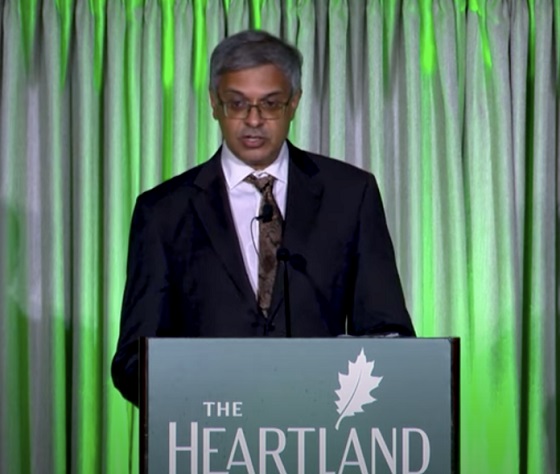Heartland Daily News
Biden, Trump Spar Over Inflation, Border, More in First Presidential Debate

From Heartland Daily News
President Joe Biden and former President Donald Trump grappled over inflation, illegal immigration, abortion and more during the first debate of this election cycle Thursday night in Atlanta.
A Quinnipiac poll released the day before the debate shows Trump with a 49%-45% lead over Biden, showing Biden needed to turn the tide Thursday night. But throughout the debate, Biden showed moments of murmuring, trailing off or seeming to lose his train of thought.
“I really don’t know what he said at the end of that sentence,” Trump said early in the debate. “I really don’t think he knows what he said either.”
Questions have surrounded Biden, 81, for a growing number stumbles and miscues in recent months.
CNN’s Jake Tapper, one of the debate’s two co-hosts, began by pointing to the rise of prices under Biden’s tenure, a 20% increase in food prices and a 30% increase for housing.
“Everything was rockin’ good,” Trump said, touting the economy, lack of wars and more during his term. “The only jobs [Biden] created are for illegal immigrants and bounceback jobs,” referring to jobs created by ending the COVID-19 lockdowns.
Biden defended himself, claiming Trump caused inflation, and touted the economic recovery after the COVID lockdown era. Biden also touted his work to lower the costs of prescription drugs.
Abortion, which is expected to be a major issue this election, took a prime spot in the debate. Biden promised to restore Roe v. Wade federal protections and blasted Trump, saying he would sign a conservative nationwide abortion ban.
Trump said he agreed with the recent U.S. Supreme Court issue allowing the abortion pill and blasted Biden and Democrats for their support of Roe v. Wade, saying it allows late term abortion. Trump argued the issue should go to the states.
Both candidates traded barbs throughout the debate. Biden called Trump a convicted felon and said he has the “morals of an alley cat.” Trump was convicted last month on 34 felony counts related to falsifying business documents to cover up hush money payments to a former porn actress.
“Everything he does is a lie,” Trump shot back later in the debate.
Trump repeatedly veered the debate back toward illegal immigration, crime committed by illegal immigrants, and the impact of migrants on entitlement programs.
Trump blasted Biden on the southern border crisis, saying that “because of [Biden’s] ridiculous, insane and very stupid policies” Americans are being killed, calling it “Biden migrant crime.”
Trump said the flood of illegal immigrants are bankrupting entitlement programs in the U.S.
“Our veterans are living on the street and these people are living in luxury hotels,” Trump said. “I’ve never seen such anger in our country before.
“He wants our country to either be destroyed or he wants to pick up those people as voters,” Trump continued.
When questioned about his role in the Jan. 6 storming of the Captiol, Trump pointed out that he called on protesters to act “peacefully and patriotically” and offered 10,000 National Guard troops for security prior to the protests but former House Speaker Nancy Pelosi and Washington, D.C. Mayor Muriel Bowser turned them down.
Biden said the Jan. 6 protesters who have been prosecuted deserve to be in jail, but Trump defended many of them, saying some of them are “so innocent” and that rioters in other cities like Portland did not go to jail.
The debate was moderated by CNN anchors Jake Tapper and Dana Bash in Atlanta.
This debate is an antecedent to two major political conventions, The Republican National Convention (RNC) and Democratic National Convention (DNC), which are scheduled for July and August, respectively.
Thursday night marked Trump and Biden’s first debate against each other in four years. The first presidential debate between them took place in Sept. 2020, during the time when Trump was still in office as U.S. president. Trump and Biden were scheduled to have a second debate on Oct. 15 2020, which ultimately was canceled. The final Trump-Biden debate of 2020 occurred on Oct. 22 2020.
Another debate is expected between the two candidates this election cycle on Sept. 10.
Originally published by The Center Square. Republished with permission.
Health
AGs Question Pediatricians Pushing Trans Treatment

From Heartland Daily News
In encouraging the use of puberty blockers, cross-sex hormones, and surgical interventions, the AAP claims the treatments are reversible. The AG letter says that is “misleading and deceptive.”
“It is beyond medical debate that puberty blockers are not fully reversible, but instead come with serious long-term consequences,”
Attorney generals from 20 states and legislators from Arizona signed an interrogatory letter to the president of the American Academy of Pediatrics (AAP) about the group’s support of puberty blockers, cross-sex hormones, and surgery for children and adolescents who have been diagnosed with gender dysphoria.
“Often the AAP has exercised its influence responsibly,” states the letter. “… But when it comes to treating children diagnosed with gender dysphoria, the AAP has abandoned its commitment to sound medical judgment.”
The AG letter demanded responses to multiple questions about its child gender policies by October 8, and it stated AAP’s conduct is being reviewed further.
Idaho Attorney General Raul R. Labrador sent the letter, and AGs from Alabama, Arkansas, Florida, Georgia, Iowa, Kansas, Louisiana, Mississippi, Missouri, Montana, Nebraska, North Dakota, Ohio, South Carolina, South Dakota, Texas, Utah, Virginia, and West Virginia signed it, as did the president of the Arizona State Senate and the speaker of the Arizona House.
Sounding an Alarm
The American College of Pediatricians (ACPeds), an alternative medical professional organization, has spent years sounding the alarm on AAP-approved transgender treatments.
ACPeds organized a coalition of health care professionals to create the Doctors Protecting Children Declaration, a document urging organizations to stop promoting what ACPeds calls unethical, harmful practices in treating children with gender dysphoria. Some 82,500 professionals and concerned citizens have signed the declaration.
“We have personally reached out to the AAP leadership and leaders of the other named organizations, asking them to put a stop to this, and have not received a response,” said ACPeds Executive Director Jill Simons, M.D.
“Unfortunately, the leadership of the AAP and other organizations have silenced their very members from engaging in medical discourse when they have put in question these harmful protocols, and they continue to double down on them even as they stand without evidence-based research to support their current positions,” said Simons.
Questioning What’s ‘Reversible’
In encouraging the use of puberty blockers, cross-sex hormones, and surgical interventions, the AAP claims the treatments are reversible. The AG letter says that is “misleading and deceptive.”
“It is beyond medical debate that puberty blockers are not fully reversible, but instead come with serious long-term consequences,” the letter states.
The letter cites the widely recognized Cass Review commissioned by Britain’s National Health Service and published in April.
“The Cass Review was monumental in demonstrating, through the most thorough review of the research and current protocols and outcomes in England, that the current protocols of social affirmation, puberty blockers, and cross-sex hormones do not improve the health outcomes of children with gender dysphoria and in fact there is evidence of causing harm,” said Simons.
“Dr. Hilary Cass’s recommendation has shut down the practice of transitioning kids in England,” said Simons. “Many other European countries are also reversing course and returning to proven medical care, which is supportive mental health and addressing underlying diagnoses.”
Leaked files from the World Professional Association of Transgender Health (WPATH) and a recent statement from the American Society of Plastics Surgeons have bolstered the case against surgical and hormonal trans treatments, says Simons.
APA, AMA Uninterested
A growing number of people are recognizing the validity of the studies, says Dr. Tim Millea, chair of the Health Care Policy Committee and Conscience Rights Protection Task Force of the Catholic Medical Association (CMA).
“Physician organizations such as AAP and [American Medical Association] appear to be uninterested in those studies, at the expense of ongoing harm to Americans that they encourage to enter the ‘gender-industrial’ medical system,” said Millea. “It seems to be true that the leadership of these groups prioritize ideology over science, which is a dereliction of duty in the vocation of medicine.”
Doctors Afraid to Speak Out
Most U.S. pediatricians are members of the AAP. Dissent within the organization has led to the development of alternative professional organizations such as ACPeds. The AAP is too radical for most pediatricians, though they are reluctant to say so, says Simons.
“I speak to countless pediatricians who are members of the AAP who disagree with the AAP’s policies and fully support our efforts to put a stop to these unethical protocols, but they are truly fearful of losing their jobs and the harms that will come to them if they speak out,” said Simons. “I unfortunately speak to pediatricians who have been reprimanded and even fired for speaking out.”
Going to Court
The AAP has been named in multiple lawsuits against doctors and hospitals. Members of ACPeds have served as expert witnesses and submitted amicus briefs to fight the AAP’s gender treatment protocols.
ACPeds also filed a lawsuit against the Biden-Harris administration for its rule requiring doctors to perform gender transition procedures on minors against their medical judgment.
“The American College of Pediatricians is filing this lawsuit against HHS because doctors should never be forced to violate their sound medical judgment and perform life-altering and sterilizing interventions on their patients,” stated ACPeds news release. “Our doctors take an oath to do no harm, but the Biden administration’s rule forces them to violate this oath and perform procedures that are harmful and dangerous to our patients– vulnerable children. What the Biden Administration is calling for is wrong and unlawful.”
Over the past several years, the CMA has been involved in gender intervention cases around the country and plans to file an amicus brief for the Supreme Court case United States v. Skrmetti, scheduled to be heard during the current session.
Changing the Culture
CMA hosted a two-hour panel discussion on September 8, 2024, in which several de-transitioners recounted the harms they suffered from gender transition procedures as minors. The organization wants to make sex-change procedures among children, teens, and young adults unthinkable, says Millea.
“There are three areas of emphasis to accomplish that goal, and two of them are judicial and legislative,” said Millea. “The third is of greatest importance, and that is cultural. The public needs to learn and understand the negative and lifelong risks and complications of gender transition.
“We remain hopeful that doctors will push back against these protocols and follow their oath to do no harm,” said Simons. “There will be a tipping point when doctors are no longer fearful and will speak out.”
Ashley Bateman ([email protected]) writes from Virginia.
Censorship Industrial Complex
‘Silicon Curtain’ Is Protecting Government Censorship

From Heartland Daily News
By AnneMarie Schieber
Citing Winston Churchill’s “Iron Curtain” metaphor describing the Cold War division of Europe, health care policy expert Dr. Jay Bhattacharya told an audience, “We are now in the middle of a Silicon Curtain of censorship descending across the previously free West.”
In a keynote address at The Heartland Institute’s Benefit Dinner in Chicago on September 13, Bhattacharya said public health is the new “fig leaf” for justifying government censorship.
“Free speech is in dire danger in the U.S.,” said Bhattacharya. “The government will use its power to suppress criticism [of] its own misinformation.”
Bhattacharya is a plaintiff in Murthy v. Missouri, in which the Supreme Court lifted a preliminary injunction directing the Biden administration not to “coerce or significantly encourage social-media companies to suppress protected speech” and remanded the case to a lower court.
“This gives a way to the government to censor at will,” said Bhattacharya. “All they have to do is send emails and algorithms to social media companies without naming a single person—just name ideas not allowed to be said online.
“The First Amendment, in effect, is an unenforceable dead letter,” said Bhattacharya.
Under Fire for Opinions
Bhattacharya, a medical doctor and professor of medicine, economics, and health care research policy at Stanford University, rose to prominence when he published The Great Barrington Declaration (GBD) on October 4, 2020, with epidemiologists Martin Kulldorff and Sunetra Gupta. The declaration criticized COVID lockdowns and urged authorities to focus on keeping children in school and protecting the elderly instead of imposing broad-based restrictions.
Although the writers were highly recognized for their work and associated with Stanford, Harvard, and Oxford Universities, respectively, powerful government figures denounced them. Francis Collins, then director of the National Institutes of Health, and Anthony Fauci, then director of the National Institute of Allergy and Infectious Diseases, called the trio “fringe epidemiologists” in emails that were made public later.
Ostracized and Blacklisted
Bhattacharya was ostracized by other professors at Stanford and was blacklisted on Twitter. When Elon Musk purchased the social media giant, he discovered the list and shared it with Bhattacharya.
Google “de-boosted” the GBD, which was posted online and signed by more than 940,000 doctors, researchers, and concerned citizens. Facebook banned posting of it altogether.
Using internal government emails they obtained, the plaintiffs showed the government was controlling social media companies by threatening to regulate them out of business if they didn’t abide by the Biden administration’s censorship demands.
The White House also used universities to help with the censorship work, which the government is prohibited from doing directly. Bhattacharya brought up the case of the Stanford Internet Observatory, which received government grants to develop algorithms to target a particular idea. The government shared that information with social media platforms.
Rising Worldwide
Europe, Canada, the U.K., and Australia have led the way on legislation to control speech, Bhattacharya told the audience. The bills and laws ostensibly outlaw violence, pornography, and hate on the internet, carry Orwellian names, and establish authorities to do the enforcement.
These include the Digital Services Act in the E.U., the Online Harms Act in Canada, and the Online Safety Act of 2023 in the U.K. A bill in France establishes a digital “safety” commission for the same purpose.
“It is dangerous to let governments have control over the definition of hate,” said Bhattacharya. “It’s even more dangerous to allow government to determine what is misinformation because science and medicine depend on free speech to operate properly.”
Censoring Political Opponents
Scott Jensen, a medical doctor and Minnesota state senator who ran against Tim Walz for governor in 2022, says his respect for Bhattacharya is immense. Jensen was a prominent critic of COVID-19 policies, and Facebook censored his election page. Jensen lost the race, and Walz went on to implement some of the most draconian COVID-19 restrictions and is Vice President Kamala Harris’s running mate in this year’s election for president.
“Dr. Bhattacharya’s willingness to present and stand by a contrarian narrative—which ultimately proved to be profoundly wise—will go down in history as an act of immense courage in the face of smothering government censorship fueled by behemoth, profit-driven technological companies,” said Jensen.
“American’s First Amendment rights are under attack by a political elite, but Dr. Jay Bhattacharya continues to stand in the breach and do whatever is necessary to protect and defend free speech,” said Jensen.
AnneMarie Schieber ([email protected]) is the managing editor of Health Care News.
-

 Business9 hours ago
Business9 hours agoQuebecers want feds to focus on illegal gun smuggling not gun confiscation
-

 Uncategorized1 day ago
Uncategorized1 day agoNew report warns WHO health rules erode Canada’s democracy and Charter rights
-

 Business10 hours ago
Business10 hours agoEmission regulations harm Canadians in exchange for no environmental benefit
-

 Energy1 day ago
Energy1 day agoMinus Forty and the Myth of Easy Energy
-

 Crime1 day ago
Crime1 day agoFrance stunned after thieves loot Louvre of Napoleon’s crown jewels
-

 Courageous Discourse7 hours ago
Courageous Discourse7 hours agoNo Exit Wound – EITHER there was a very public “miracle” OR Charlie Kirk’s murder is not as it appears
-

 Frontier Centre for Public Policy2 days ago
Frontier Centre for Public Policy2 days agoOttawa Should Think Twice Before Taxing Churches
-

 Alberta2 days ago
Alberta2 days agoBusting five myths about the Alberta oil sands






